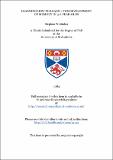Files in this item
Learning how to learn : the development of memory in 3-6 year-olds
Item metadata
| dc.contributor.advisor | McShane, John | |
| dc.contributor.author | Whittaker, Stephen | |
| dc.coverage.spatial | viii, 377 p. | en_US |
| dc.date.accessioned | 2018-07-09T15:22:37Z | |
| dc.date.available | 2018-07-09T15:22:37Z | |
| dc.date.issued | 1984 | |
| dc.identifier.uri | https://hdl.handle.net/10023/15144 | |
| dc.description.abstract | The aim of the present study was to investigate the development of children's ability to make use of external sources of information when they are studying or remembering different types of information. More specifically, the research was directed at two recurring problems for theories of memory development: the production deficit; and the problem of change. The production deficit describes children's failure to spontaneously use a strategy which is 'in' their behavioural repertoire. Use of the strategy can be induced with minimal training. The study contains a set of experiments which suggest a number of reasons why children may fail to use available strategies. Another major problem with theories of memory development lies in explaining changes in strategy use. Three experiments address the issue, and suggest two mechanisms which produce such changes. The experiments indicate that feedback may provide one means by which routines already in the cognitive system are generalised to serve memory goals. Monitoring of one's own performance may also produce such changes. These mechanisms are incorporated into a model of how early strategies might develop. Other theories of memory development have stressed young children's lack of knowledge about their own memory processes. This has been invoked to explain both the production deficit and developmental change. Apart from the demonstrations that monitoring may influence strategy generalization, the study found little evidence that knowledge about memory is related to either of these phenomena. Current theories of the development of knowledge about memory are reviewed, and it is suggested that there are major problems with explanations of memory which appeal to such knowledge. One weakness of such theories is that they fail to explain the origins of this knowledge. The present study provides an account of the early development of knowledge about memory. The results of the experiments are also considered in the light of recent speculations about developmental theories and also memory processes in adults. It is suggested that the mechanisms of change demonstrated in this study may well apply to other areas of development. It is also argued that recent theories may have misrepresented the nature of adult memory processes. | en_US |
| dc.language.iso | en | en_US |
| dc.publisher | University of St Andrews | |
| dc.subject.lcc | BF723.M4W5 | en |
| dc.subject.lcsh | Memory in children | en |
| dc.title | Learning how to learn : the development of memory in 3-6 year-olds | en_US |
| dc.type | Thesis | en_US |
| dc.contributor.sponsor | Social Science Research Council (Great Britain) | en_US |
| dc.type.qualificationlevel | Doctoral | en_US |
| dc.type.qualificationname | PhD Doctor of Philosophy | en_US |
| dc.publisher.institution | The University of St Andrews | en_US |
This item appears in the following Collection(s)
Items in the St Andrews Research Repository are protected by copyright, with all rights reserved, unless otherwise indicated.

